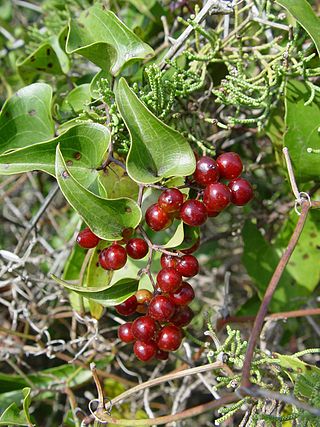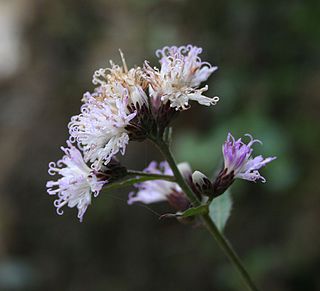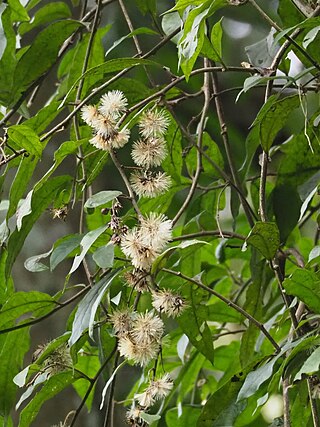
Smilax is a genus of about 300–350 species, found in the tropics and subtropics worldwide. They are climbing flowering plants, many of which are woody and/or thorny, in the monocotyledon family Smilacaceae, native throughout the tropical and subtropical regions of the world. Common names include catbriers, greenbriers, prickly-ivys and smilaxes. Sarsaparilla is a name used specifically for the Neotropical S. ornata as well as a catch-all term in particular for American species. Occasionally, the non-woody species such as the smooth herbaceous greenbrier are separated as genus Nemexia; they are commonly known by the rather ambiguous name carrion flowers.

Calyceraceae is a plant family in the order Asterales. The natural distribution of the about sixty species belonging to this family is restricted to the southern half of South America. The species of the family resemble both the family Asteraceae and the Dipsacaceae.

Chionanthus, common name: fringetrees, is a genus of about 150 species of flowering plants in the family Oleaceae.

Gynura is a genus of flowering plants in the daisy family Asteraceae native to Asia. The best known species is Gynura aurantiaca, often grown as a house plant. This plant is commonly known as purple passion because of the velvety purple leaves.

Cicerbita is a genus of flowering plants in the family Asteraceae, native to Asia and Europe. They are known commonly as blue sow thistles. The word Cicerbita is from the Italian, meaning "chickory-like", a comparison to Cichorium, the chicory genus.

The Cichorioideae are a subfamily of the family Asteraceae of flowering plants. Familiar members of Cichorioideae include lettuce, dandelions, chicory and Gazania species. The subfamily comprises about 240 genera and about 2900 species. It is heterogeneous and hard to characterize except with molecular characters.
Iodocephalus is a genus of flowering plants in the family Asteraceae.
Proteopsis is a genus of flowering plants in the tribe Vernonieae within the family Asteraceae.
Baccharoides is a genus of Asian and African plants in the tribe Vernonieae within the family Asteraceae.
Hololepis is a genus of Brazilian plants in the tribe Vernonieae within the family Asteraceae.

Acilepis is a genus of Asian plants in the tribe Vernonieae within the family Asteraceae.

Eirmocephala is a genus of Latin American plants in the tribe Vernonieae within the family Asteraceae.
Strobocalyx is a genus of Asian, African, Pacific Island, and South American plants in the tribe Vernonieae within the family Asteraceae. It is sometimes regarded as part of the genus Vernonia.

Decaneuropsis is a genus of plants in the tribe Vernonieae in the family Asteraceae. Species of the genus Decaneuropsis are found in Asia. Some authorities consider the group part of the genus Vernonia.
Xiphochaeta is a genus of South American plants in the tribe Vernonieae within the family Asteraceae.

Gymnanthemum mespilifolium, is a sprawling woody liane up to 15 cm thick from Southern Africa occurring in the Eastern Cape, KwaZulu-Natal, Limpopo, Mpumalanga, Western Cape. This species is found as a vigorous pioneer in abused or degraded habitats such as cleared areas and forest margins. The genus comprises some 43 species found in sub-Saharan Africa, Madagascar, Southern Asia, and introduced into Brazil.
Oocephala is a genus of plants in the family Asteraceae, native to Africa. The name means "egghead", referring to the egg-shaped capitulum, which distinguishes the genus from its close relative Polydora. Some species were formerly placed in the genus Vernonia.
Okia is a genus of flowering plants belonging to the family Asteraceae.
Hoffmannanthus is a monotypic genus of flowering plants in the Asteraceae. There is only one known species, Hoffmannanthus abbotianus(O.Hoffm.) H.Rob., S.C.Keeley & Skvarla Its native range is Uganda and southern Tropical Africa. It is found in the countries of Angola, Kenya, Tanzania, Uganda, Zambia and Zaïre.

Jeffreycia is a genus of African flowering plants in the family Asteraceae. They are in the tribe Vernonieae.











